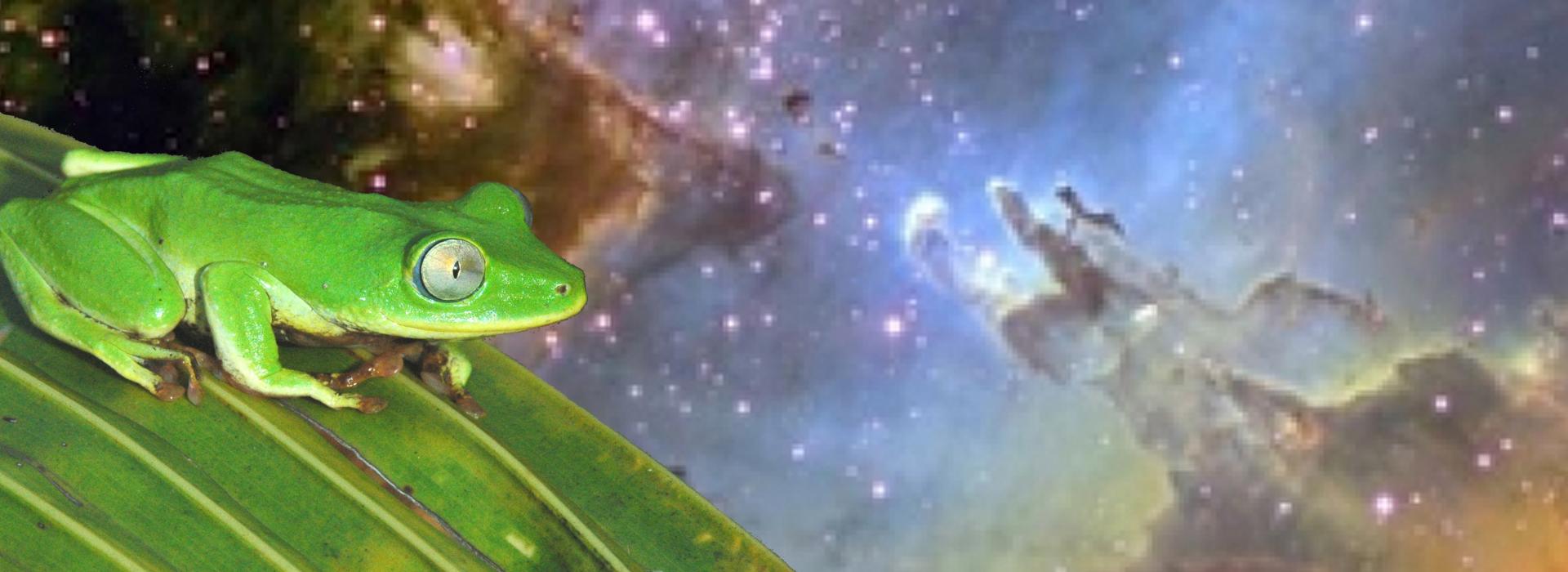Breadcrumb
Natural Sciences
The strength of the Natural Sciences course at Cambridge is the breadth and variety of subject choice across the physical and biological sciences, allowing students to tailor their programme of study according to their individual interests.
All Natural Sciences students take three experimental science subjects in their first year, plus a maths course. The ‘experimental’ subjects are Physics, Material Sciences, Earth Sciences, Chemistry, Cell Biology, Physiology and Evolution & Behaviour. The maths courses have focuses on the physical/chemical sciences (Maths A and B) or biology (Mathematical Biology); none are ‘easy’ options and should be chosen based on your particular scientific interest. See the University website for more details of the Natural Sciences course.
In the second year, students choose three subjects from nineteen possible options. In the third year, they either specialise in one subject from a choice of fifteen or choose a more broad-based physical or biological sciences course with both "major" and "minor" subjects. Fourth-year courses are also available for eight subjects (Astrophysics, Biochemistry, Chemistry, Earth Sciences, History & Philosophy of Science, Materials Science, Physics and Systems Biology). See the University website for second and third year courses.
Natural Sciences at Peterhouse
Peterhouse has always been a particularly strong college for Natural Sciences. The college has produced five Nobel Laureates in the last 60 years, in the fields of chemistry, molecular biology and biological computing. The college was at the centre of the development of molecular biology and is still at the cutting edge of scientific endeavour, including in particle physics, theoretical chemistry, ecology and synthetic biology. The success of the college in Natural Sciences comes from our focus on the very best teaching, our supportive cohorts of students and the opportunities available for our students through our exceptional links to research institutions and the wide variety of study and travel grants that the college provides.
Most of our first and second year teaching is carried out by Fellows and other supervisors with close links to the college, all highly experienced. Our Directors of Studies are all active in teaching so academic progress is closely supported for all our students. We have some of the best travel grants in the University and these enable many of our students to take advantage of vacation work placements, projects and field-work opportunities. Through these, students are able to investigate the very latest scientific advances, from physics and developmental genetics to studying Darwin’s beetle collection and taking advantage of tropical island ecology internships established specifically for Peterhouse students. The College’s scientific society, the Kelvin Club, is highly active; organising fortnightly talks from top scientists from within Cambridge and elsewhere. In addition to our academic strengths we aim to maintain a Natural Sciences community that everyone enjoys being part of; we are confident that we provide the best social events (dinners, desserts and BBQs) of any college!
Physics
Peterhouse has the strongest links of any college to CERN, and this contributes to our outstanding reputation for Physics. Many Peterhouse students have gone on to work in High Energy or Theoretical Physics, and/or have undertaken project work at CERN. Professor Andy Parker works on the ATLAS experiment at CERN, looking for exotic states of matter. He used to teach physics to first year students at Peterhouse and is now the college's Master. Dr Chris Lester works on the ATLAS experiment at CERN, looking for invisible particles that might make up dark matter and supersymmetry. He teaches physics and maths and has been known to lecture from one of his unicycles. Dr Ali Mashayek supervises first-year Physics. He researches the physics and biochemistry of climate systems in the Department of Earth Sciences.
Material Sciences
Our Material Scientists are Dr Louise Hirst, who works on the development of high efficiency photovoltaics, leading the University’s Space Photovoltaics Group, and Professor Paul Midgley, who works on bringing electron microscopy to below the nanometre scale thought electron tomography.
Chemistry
For many year Peterhouse’s students have excelled in Chemistry. Dr Dr Tim Dickens supervises first-year Chemistry and supports our chemists throughout their time in the college. He has a background in industrial chemistry and researches NMR Ring Current calculations on congregate aromatic systems. Professor Sophie Jackson has a long standing research interest in protein folding and teaches parts of the second and third-year chemistry courses. Dr Alex Thom supervises first and second-year maths courses for Natural Sciences, as well as Theoretical Chemistry courses. Dr Thom is a theoretical chemist and has a keen interest in Oenology. Professor Chris Rogers teachers second-year Physical Chemistry, supervising on topics such as quantum mechanics, statistical mechanics, symmetry and the electronic structure of solid. His research is in developing new Magnetic Resonance Imaging (MRI) techniques for medical diagnosis.
Biology
Peterhouse can justly claim to be the most dynamic college for Biology; with regular discussion meetings, termly biodiversity monitoring of the gardens and an annual biological Research Symposium. We are also the best connected college if you are interested in ecology, with Peterhouse students having unique access to tropical island ecology and conservation internships in the Seychelles and Polynesian islands. Activities of Peterhouse biologists (undergraduates, graduates and Fellows) are summarised in the annual Peterhouse Biology Newsletter and external links give further details of biology at Peterhouse.
Dr Justin Gerlach specialises in teaching whole-organismal biology courses that cover evolution, behaviour, ecology and physiology. His goal in teaching is to convey an enthusiasm for all biodiversity and to foster scientific writing of the very highest standard. When not teaching undergraduates, he carries out evolutionary research and conservation projects on everything from tropical snails to giant tortoises. These projects are designed specifically to give exceptional field-work opportunities to Peterhouse students interested in ecology and conservation.
Dr Graham Christie heads the Molecular Microbiology research group within the Department of Chemical Engineering and Biotechnology. He supervises cell and biochemistry courses, drawing upon his research interests in bacterial molecular genetics, structural biology and advanced cellular imaging techniques.
For a student's perspective on life as a 'NatSci' at Peterhouse, have a look at the JCR's 'day in the life of a science student'.
Biological Natural Sciences FAQ with Dr Justin Gerlach
Physical Natural Sciences FAQ with Professor Sophie Jackson
Course requirements
Physical scientists should be studying Mathematics and at least one of Chemistry or Physics to A level or equivalent, with Further Mathematics and the other of Chemistry or Physics to A level advantageous.
In this application round, applicants who are only taking two maths/science subjects at A-level or equivalent, or who are not taking Maths on the Biological stream, can outline any restrictions or constraints on school subject choice in My Cambridge Application. However, such applicants should note that historically the vast majority of students have applied with three maths/science subjects and the success rate of such students has typically been significantly higher. A strong performance in the ESAT will help us to determine whether the application is competitive”
The application process
Candidates are asked to indicate whether this wish to apply as a Physical or Biological scientist, however this does not restrict options at all once at Cambridge and is done to determine how your application will be assessed and which interviews you will receive. If an applicant wishes to specialise in primarily biological sciences but wants to have the option of taking a physics course in their first year, they should inform the Admissions Office of this so that a separate physics interview can be arranged. If you are uncertain whether a Biology or Physics application is more appropriate, it is sensible to discuss this with the Admissions Office. The final choice of first year courses is only confirmed once students arrive in October and some students switch ‘sides’ every year on arrival. This is the advantage of such a flexible course.
Natural Sciences applicants across the University are asked to sit the Engineering and Sciences Admissions Test (ESAT) at their local testing centre. Pre-registration is required. These will form part of our holistic assessment of candidates' achievements, abilities and potential and are no more, and no less important than any of the other pieces of information considered during the admissions process. Registration for this assessment closes in mid-September. Further information can be found on the University website.
Four of our Science Fellows conduct the two 30-minute interviews. Interview questions will have a scientific focus, but the interviewers are not expecting candidates to know a "correct answer" but are interested in how candidates respond to new ideas or approach unfamiliar problems.
Typical conditional offers
Our typical conditional offer for Natural Sciences is A*A*A at A level. IB offers are usually for a minimum of 41-42 points, to include 776 or 777 at Higher level in relevant subjects. We would expect the highest grades to be achieved in science or mathematics subjects. Offers are designed to be realistic, taking into account individual circumstances, and to reflect potential and likely levels of achievement. Most of those who receive offers will attain the grades required.
Further resources and reading
If you are interested in studying Natural Sciences we recommend you read around the sciences widely and see what interests you beyond the confines of the school curriculum. Recommended books are:
‘How Chemical Reactions Happen’ by James Keeler & Peter Wothers – a very useful introduction to what is really going on in chemistry
‘Essential Biology’ by Justin Gerlach - a synthesis of all the biology that is useful background for starting an undergraduate biology course
‘Evolution’ by Mark Ridley – an excellent account of evolutionary biology
‘The Selfish Gene’ by Richard Dawkins – still the best exposition of the most important concept in biology: the role of the gene
‘Power, Sex, Suicide: Mitochondria and the Meaning of Life' by Nick Lane – a thought provoking aspect of cell biology
‘Spillover’ and other books by David Quamen – well written accounts of aspects of biology you’ve probably not thought about. Similarly, any of the collections of essays by Stephen Jay Gould are very stimulating and models of great science writing.


